News & Events in Belarus
Lukashenko remains determined to improve school catering in Belarus
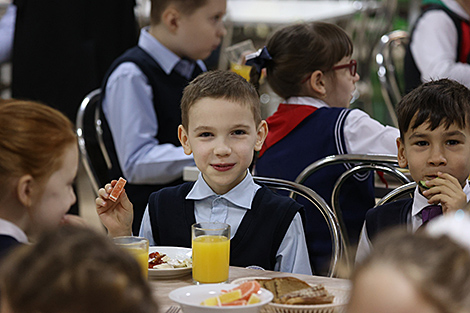
An archive photo
There are about a million schoolchildren in Belarus. The meals of more than 700,000 of them will be subsidized by the government this year. In this episode of BelTA's “After the fact: Lukashenko's decisions” project, we will tell you what Belarusian schoolchildren eat, why hamburgers have no chance to get on the menu, what dishes were included in the menu upon children's requests, why Aleksandr Lukashenko criticizes the education system and what the president ordered to change in school canteens.
Rationale behind Belarus' decision to subsidize school meals
Subsidized meals were introduced in Belarusian schools back in the late 1990s, at first in the Chernobyl-affected regions, and then throughout the country. The president explained his decision: many families were struggling and needed support. The government could not act otherwise.
There were many families that could not feed their children properly. It was the reason why I introduced subsidized meals in the Chernobyl zone, and after that in the entire country. Meals are now subsidized everywhere, therefore they are cheap, and in many places they are even free. I told the officials back then: “Our children have the opportunity to eat well, while many people have low-paying jobs and can't afford cooking good meals for their kids. Meanwhile at school children can eat good soup, the second course, a salad etc. A good lunch is very important. In this way we invest in children, at least we make sure that they eat well,” the head of state said at the press conference for Russian journalists in 2007.
Reasons behind an experiment with school catering in Belarus
In the previous academic year, an experiment was conducted in two dozen urban and rural schools in Belarus. The task was simple and difficult at the same time - to make meals more tasty and to reduce food waste. To fulfill the first part of the task, children's food preferences were studied. Opinion polls were conducted through questionnaires, thematic chats, and even ‘wish boxes'. At first students did not ask for much, ordering pasta with sausages and cheesecakes. Later they added pancakes and dumplings to their wish lists. At the end of the study children's wishes became rather extravagant as they asked for hamburgers and shawarma.
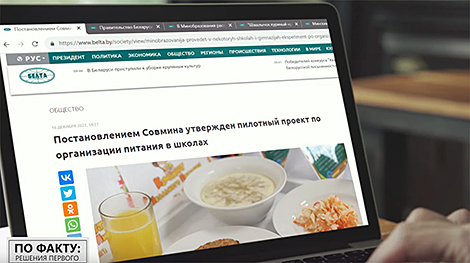
Of course, the Sanitary and Epidemiological Service of the Healthcare Ministry immediately interfered to clarify: there will be no fast food on the menu. Despite new approaches to catering, the main principle remained unchanged: food must be healthy.
“Why do we care so much about school meals? Our specialists studied what our children eat at home. The study revealed an excessive intake of saturated fats and simple sugars combined with a lack of fruit and vegetables. This is what children's nutrition at home looks like. Such an unhealthy diet should be offset by school meals,” said Head of the Department for Children and Adolescents' Hygiene of the National Center for Hygiene, Epidemiology and Public Health of the Healthcare Ministry Alla Malakhova.
What's on menu at school canteens?
The experiment helped identify the dishes that most schoolchildren like. As a result, 329 recipes made it to the information digest of the Education Ministry. In addition to recipes, it contains detailed information on how dishes should be cooked, what they should look like, how long and how they should be stored, and what nutritional value they have. Those who like porridge for breakfast, pay attention to the dish called Orange Surprise. It consists of rice and millet groats, as well as tangerines. Sounds delicious.
Here is another interesting fact. It has turned out that rural and urban children have different food preferences. For example, children in rural areas always eat soup for lunch, which is rarely the case in urban families.
“It might be very difficult for a family to feed two children. And in such a big city as Minsk, 230,000 children need to be fed. These are junior and high school students, and you need to take into account their wishes. Therefore, this work is not easy,” Director of Minsk School Catering Company Nadezhda Lukashevich said. “During the experiment, we suggested dishes that had never been on the menu in Minsk schools before. Like a stewed vegetable mix consisting of broccoli, cauliflower, carrots, as well as pelmeni (dumplings). Dumplings turned out to be very popular with kids.”
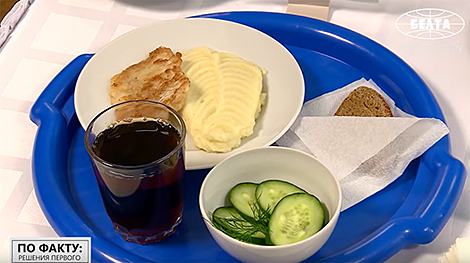
According to her, dumplings are made according to a special recipe. The manufacturer improved the quality, eliminated excess salt. This is not mass production, these are special dumplings, you can't buy such dumplings in the store. Everyone says that they are really tasty, have an interesting shape. The most important thing is that children like them, she said.
What steps were taken to improve school catering
Over the summer, more than 1,500 school cooks underwent advanced training. More than 630 units of technological equipment were purchased for schools. Capital repairs were carried out in 134 canteens. All the shortcomings were eliminated during the pilot project, including the problem of a large amount of food waste. For example, according to the State Control Committee, in one of schools in Gomel, more than 40% of fried fish, almost a third of mashed potatoes and every fourth salad that second and third-graders had for lunch was dumped. Indeed, it is important for children how their meals look. They refuse to eat what they perceive as unsavory, undiversified and unappetizing. As a result of the experiment, food waste in school canteens dropped by 20-25%. Yet, Aleksandr Lukashenko draws attention to another important thing.
“I pay special attention to food. This is very important. It is not okay to have a pig farm near every school in order to feed food waste to pigs. This is not ethical to throw away food, although it has become a trend recently,” Aleksandr Lukashenko said at the recent meeting to discuss preparations for the new academic year.
Providing school students and preschoolers with high quality meals can be considered an issue of national security. This means it is crucial to maintain tight control over such issues. It comes as no surprise that the head of state criticizes any imbalances in the area. For example, in one of the country's schools free school meals for children from low-income families were quite different from the meals their classmates got on a paid basis. The president called this approach medieval savagery.
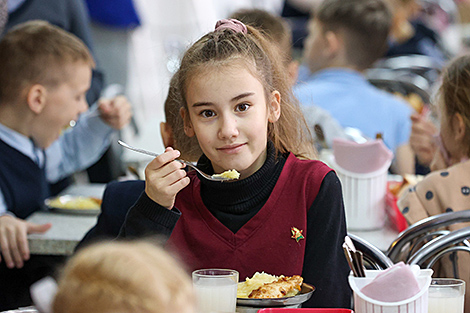
“It is medieval savagery when children from low-income families, supported by the state, have to eat cabbage salad potato soup, and get no cutlets or sausages. It's better to feed no one at all than to draw such lines between children at school. The Minsk mayor has briefed me that the situation was rectified within a week. I ask you and even demand to eliminate this savagery before the New Year. Children will be fed at schools as it should be done. Children should be fed, and they should get healthy and nutritious meals,” Aleksandr Lukashenko said.
An incident like that finally led to arrests and criminal proceedings. Some criminals in Minsk decided to profit from children's health. Criminal groups collected money from school cooks, who in turn reduced the size of school meals, processed leftovers or simply changed the recipe. You can probably guess how the Belarusian president responded to this.
“Mr. [former Minsk Mayor Andrei] Shorets, how come that children are fed food waste at schools in Minsk Hero City? In nine districts nine criminal groups are collecting bribe money in envelopes for some scoundrel from school cooks and those providing schools with school meals. What would you do if you were me, if you received such information? They were all arrested. That was my command to the KGB chairman to catch all of them red-handed. So was it done. How would you react to such things? Your children, your grandchildren attend these schools. They reused yesterday's food leftovers to feed children the next day. They did not put enough food in school meals, sold the extra, collected the money and handed these money envelopes over to him. Probably, the adopted law on corruption, which is probably the toughest one in our country, still bring insufficient results,” the head of state said in his Address to the Belarusian people and the National Assembly in 2017.
Preventive measures implemented at educational institutions and school canteens over the past three years has made it possible to more than halve the amount of criticism from the supervisory bodies. Yes, some violations are still in place. However, they are not systemic, but happen more often due to a human factor. The relevant measures are taken to punish employees who commit violations.
How do school meal programs change in Belarus?
The Belarusian education system is searching for the most optimal approach to school meal programs. The biggest proof of this is the ministry's openness to any suggestions and even criticism. Polls, questionnaires, and meetings are held on a regular basis. The Education Ministry has recently introduced a chatbot to answer people's questions about school meals.
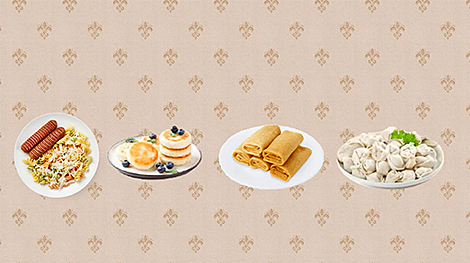
With a new school year approaching, the government has increased budget spending on meals for children at kindergartens and schools. This year an interesting offer comes from the Minsk School Catering Company that will give presents to students who eat well in the school canteen. An excellent appetite will be rewarded with an opportunity to attend a culinary master class. Children will be offered to try their hand in cooking pizza, making colored salt, decorating cupcakes, making cake pops and many more.
In the previous school year different cities of the country ran a similar project. The campaign was called Clean Plate. Children eating all of their lunches were given prizes. The school catering company noted that children ate better on such days, and there was practically no food waste.
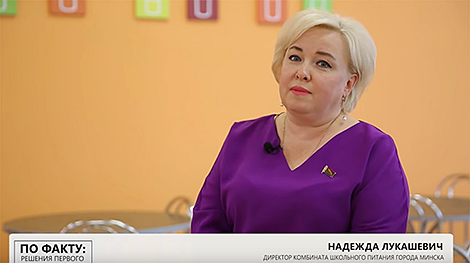
“The pilot project ran in five schools of Minsk. We offered the children a choice of two dishes. This choice in elementary school was made with the help of class teachers and parents. In one class children ate different lunches according to their preferences. And we noticed that the amount of food waste decreased. It varied from day to day, but the reduction was 15-20% and even 30%. When children make the choice themselves, they take a more responsible approach to their food,” Nadezhda Lukashevich said. “Someone prefers fish, someone prefers chicken, someone likes pork. The choice is influenced by different family traditions, taste preferences, so it is crucial to respect everyone's choice. It is important for children to gets hot meals.”
More than 60% of schools will introduce new approaches to providing their students with school meals in the new academic year. The Education Ministry is confident that the results of the pilot project will bring school meal programs to a fundamentally new level. Parents, however, should remember that school meals are only 20-25% of a child's daily needs. Children's health and safety is a common cause.


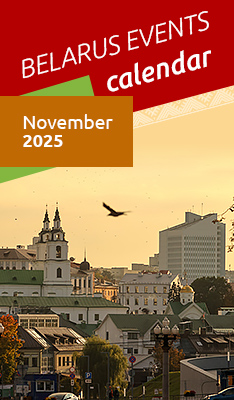




 print version
print version make home page
make home page add to bookmarks
add to bookmarks

